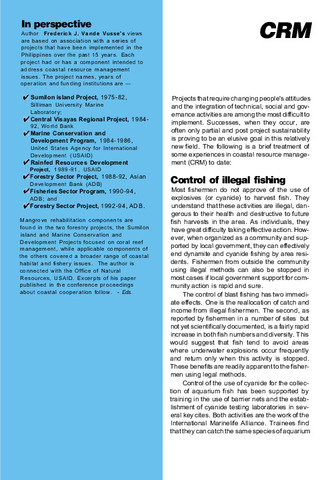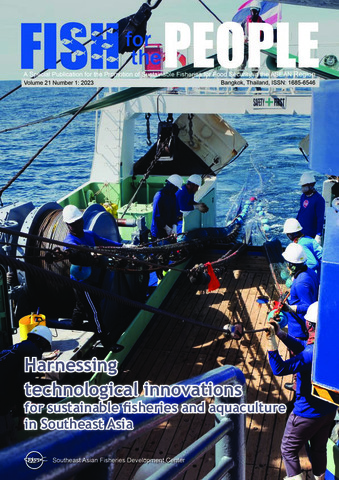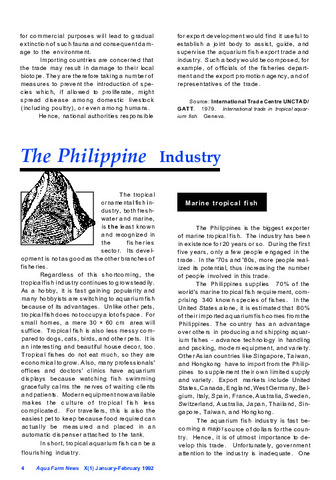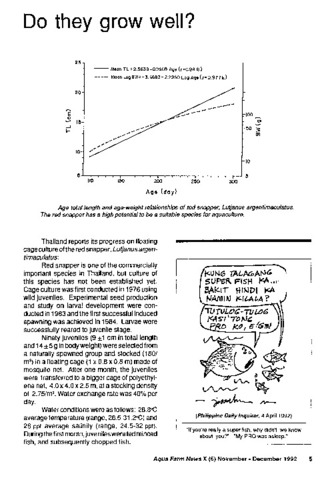CRM in the Philippines: Lessons learned
Share
Abstract
Philippine coastal communities can become capable fishery resource managers and that their management practices can become largely self-sustaining if the project approach focuses on assisting fishermen to learn how to help themselves. Community organization is an essential part of the process and should not be viewed as an end product in itself. There are also no quick fixes, and projects require a complex array of activities if large numbers of coastal residents are to be assisted. In some of these projects, the control of illegal fishing combined with limiting of commercial fishing to offshore areas and good coastal habitat management resulted in a doubling of daily fish catch and income for small-scale fishermen. However, even with the best of management, the total fishery harvest is limited and further increases in individual fishing income can only come from reducing total fishing effort. This will require a system of control on access to the resource to limit the number and kind of fishing gears and to divide the resource equitably. Assisting coastal communities to devise and implement realistic equitable access controls is the major challenge facing coastal resource co-management.
Suggested Citation
Southeast Asian Fisheries Development Center, Aquaculture Department (1996). CRM in the Philippines: Lessons learned. Aqua Farm News , 14(2-3), 26-30. http://hdl.handle.net/10862/2427
Subject
marine environment  ; coastal fisheries
; coastal fisheries  ; coastal zone management
; coastal zone management  ; community planning; fisheries development
; community planning; fisheries development  ; fishery policies
; fishery policies  ; fishery regulations
; fishery regulations  ; fishery resources
; fishery resources  ; fishing effort
; fishing effort  ; fishing gear
; fishing gear  ; fishing rights
; fishing rights  ; fishing communities
; fishing communities  ; illegal fishing
; illegal fishing  ; resource management
; resource management  ; socioeconomic aspects
; socioeconomic aspects  ; sociology
; sociology  ; sport fishing
; sport fishing  ; Philippines
; Philippines 
 ; coastal fisheries
; coastal fisheries  ; coastal zone management
; coastal zone management  ; community planning; fisheries development
; community planning; fisheries development  ; fishery policies
; fishery policies  ; fishery regulations
; fishery regulations  ; fishery resources
; fishery resources  ; fishing effort
; fishing effort  ; fishing gear
; fishing gear  ; fishing rights
; fishing rights  ; fishing communities
; fishing communities  ; illegal fishing
; illegal fishing  ; resource management
; resource management  ; socioeconomic aspects
; socioeconomic aspects  ; sociology
; sociology  ; sport fishing
; sport fishing  ; Philippines
; Philippines 
Collections
- Aqua Farm News [286]
Related items
Showing items related by title, author, creator and subject.
-
Fish for the People Vol.21 No.1
Southeast Asian Fisheries Development Center (Secretariat, Southeast Asian Fisheries Development Center, 2023-07) -
The Philippine industry: Marine tropical fish
Castaños, Milagros T.; Southeast Asian Fisheries Development Center, Aquaculture Department (Aquaculture Department, Southeast Asian Fisheries Development Center, 1992) -
Do they [snappers] grow well?
Castaños, Milagros T.; Southeast Asian Fisheries Development Center, Aquaculture Department (Aquaculture Department, Southeast Asian Fisheries Development Center, 1992)




